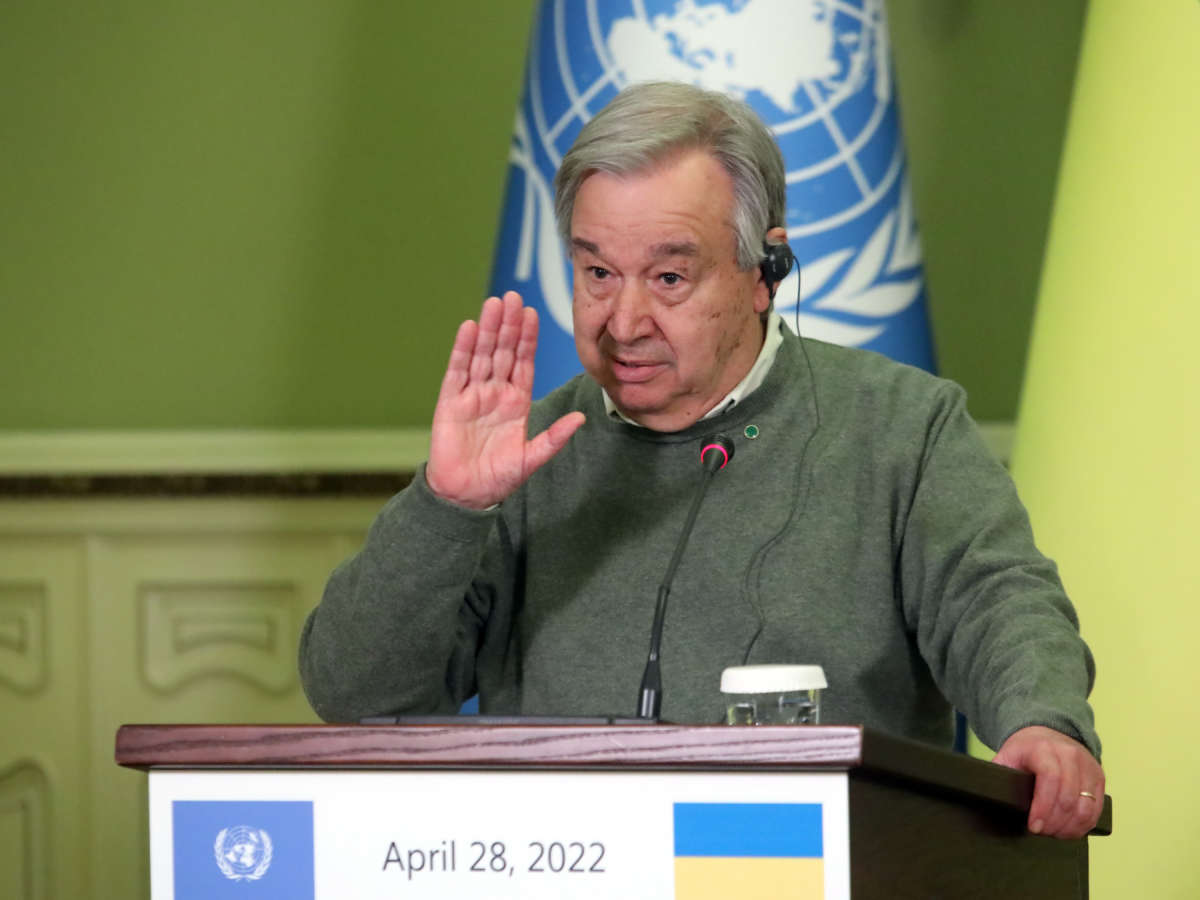United Nations Secretary-General António Guterres on Saturday slammed the fossil fuel industry for trying to use Russia’s war on Ukraine to boost polluters’ profits at the expense of the global climate and all life on Earth.
“Fossil fuel interests are now cynically using the war in Ukraine to try to lock in a high carbon future,” Guterres tweeted. “A shift to renewables is crucial to mending our broken global energy mix and offering hope to millions suffering climate impacts today.”
Climate action advocates welcomed the U.N. chief’s message — including American author and activist Bill McKibben, who said that Guterres “may understand this moment better than any other official on the planet. And this may be the most important tweet of the spring.”
Exactly this – seeking to slam tightly shut the rapidly closing window on a liveable future. #JustStopOil https://t.co/WSstcC1v4R
— XRNewark&Sherwood (@XRNewark) April 30, 2022
Guterres’ tweet followed his Thursday trip to sites of alleged war crimes in Ukraine. During the tour, he said that “the war is evil,” emphasized the need for “a thorough investigation and accountability,” and urged Russia to cooperate with the International Criminal Court — which opened a probe after Russian President Vladimir Putin launched the invasion in February.
Putin’s war has not only impacted Russians and Ukrainians; it has also disrupted the global supply of food and fuel. Western governments have responded to the invasion by arming Ukraine and sanctioning Russia — a key exporter of oil and gas.
U.S. President Joe Biden and European Commission President Ursula von der Leyen last month announced a joint task force intended “to reduce Europe’s dependence on Russian fossil fuels and strengthen European energy security.” In a letter to the pair earlier this month, over 200 groups called for ramping up the clean energy transition rather than boosting fossil fuel shipments from the United States to Europe.
“Any expansion of liquefied natural gas (LNG) infrastructure will further reliance on fossil fuels, which is incompatible with climate science, justice, as well as U.S. and E.U. commitments to climate leadership,” the groups wrote. “We must also stress that new fossil fuel infrastructure will harm communities near fracking wells, pipelines, power plants, and LNG infrastructure.”
“LNG infrastructure can take three years or more to come online, diverting resources away from the infrastructure investments that will actually help rapidly reduce demand for gas,” they noted. “Redirecting existing LNG exports, combined with energy efficiency measures and an all-out mobilization to renewable energy, could immediately address Europe’s current reliance on Russian gas.”
The ongoing war coincides with the early April release of the latest Intergovernmental Panel on Climate Change (IPCC) report — which led Guterres to declare that the world, but particularly rich nations most responsible for pollution, “must triple the speed of the shift to renewable energy.”
“That means moving investments and subsidies from fossil fuels to renewables — now,” he said at the time. “In most cases, renewables are already far cheaper. It means governments ending the funding of coal, not just abroad, but at home.”
Climate campaigners and progressive U.S. lawmakers have accused fossil fuel giants of using the war to price gouge consumers while filling the pockets of top executives and shareholders. Members of Congress are weighing a windfall profits tax intended to prevent such behavior by companies while providing relief via rebates to people facing high prices at the pump.
As Common Dreams reported Friday, Chevron and ExxonMobil announced that their profits soared during the first quarter of this year — to $6.3 billion and $5.5 billion, respectively — bolstering demands for a windfall tax.
“This is robbery,” asserted Fossil Free Media director Jamie Henn, calling on Congress to pass a tax bill. “Big Oil is intentionally profiteering off the war in Ukraine — a crisis they helped create by working with Putin for decades to expand Russian oil and gas production.”


